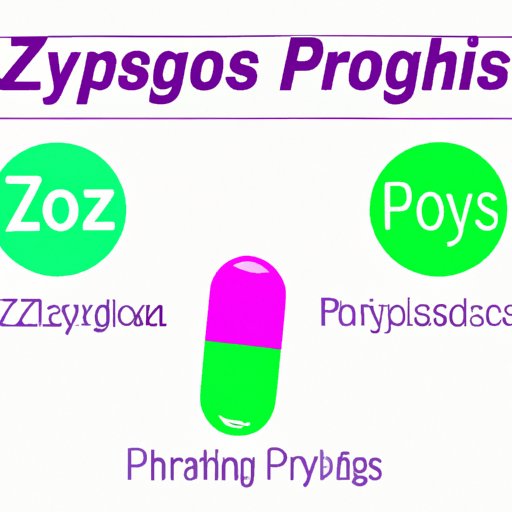
I. Introduction
Prozac, or fluoxetine, is a popular antidepressant medication that works by altering the levels of serotonin in the brain. While it is primarily used to treat depression and anxiety, many people have noticed that taking Prozac causes weight loss. In this article, we will explore the scientific connection between Prozac and weight loss, as well as the potential risks associated with this medication as a weight loss treatment.
II. The Scientific Connection between Prozac and Weight Loss
Prozac works by inhibiting the reuptake of serotonin, a neurotransmitter that modulates mood, appetite, and other bodily processes. By increasing the availability of serotonin in the brain, Prozac can help regulate mood and reduce anxiety. However, some researchers believe that Prozac can also affect weight by altering the levels of other hormones and neurotransmitters.
One potential explanation for Prozac-induced weight loss is that it affects the activity of the hypothalamus, a part of the brain that controls hunger and satiety. By modulating the levels of serotonin and other neurotransmitters in the hypothalamus, Prozac may reduce appetite and increase the sensation of fullness, leading to decreased food intake and weight loss.
III. Studies on Prozac and Weight Loss
Several scientific studies have investigated the relationship between Prozac and weight loss. One study published in the Journal of Clinical Psychiatry in 1992 found that approximately 15% of patients who took Prozac experienced weight loss, with an average decrease of 1.3 kg over a 6-week period.
Another study published in the Journal of Clinical Psychopharmacology in 2004 found that Prozac was more likely to cause weight loss than other antidepressants such as Paxil and Zoloft. The study analyzed the medical records of over 17,000 patients who were prescribed antidepressants and found that those who took Prozac were more likely to experience weight loss than those who took other medications.
While these studies suggest that Prozac may be effective at promoting weight loss in some individuals, it is important to note that weight loss is not a guaranteed side effect of this medication. Additionally, these studies have limitations, such as small sample sizes and varying dosages of Prozac among patients.
IV. Comparison with Other Antidepressants
Antidepressants work by modulating the levels of neurotransmitters such as serotonin, dopamine, and norepinephrine in the brain. While many different types of antidepressants exist, they can be broadly categorized into selective serotonin reuptake inhibitors (SSRIs), serotonin-norepinephrine reuptake inhibitors (SNRIs), tricyclic antidepressants (TCAs), and monoamine oxidase inhibitors (MAOIs).
Compared to other antidepressants, Prozac may be more likely to cause weight loss due to its selective inhibition of serotonin reuptake. SSRIs such as Prozac have been shown to affect food intake and body weight in rodents and humans, whereas other types of antidepressants such as TCAs and MAOIs may actually cause weight gain.
V. Benefits and Risks of Using Prozac for Weight Loss
While weight loss may be a desirable side effect for some individuals, it is important to weigh the potential benefits and risks of using Prozac for this purpose.
Benefits of using Prozac for weight loss may include an improvement in overall mood and reduction in anxiety, which could lead to healthier lifestyle choices and long-term weight management. Additionally, since Prozac is a prescription medication, it can be obtained under the guidance of a healthcare professional who can monitor potential side effects and provide support throughout the weight loss process.
However, using Prozac for weight loss also carries potential risks. Some individuals may experience side effects such as nausea, dizziness, and insomnia, which could negatively impact their overall health and well-being. Additionally, since Prozac alters the levels of neurotransmitters in the brain, it can have long-term effects on mood, behavior, and appetite regulation.
VI. Tips for Managing Weight Loss Symptoms while on Prozac
If you are experiencing weight loss as a side effect of Prozac, there are several practical tips you can follow to manage your symptoms:
- Maintain a healthy and balanced diet
- Engage in regular exercise and physical activity
- Monitor your weight and seek advice from a healthcare professional if necessary
- Stay hydrated and avoid foods that are high in fat and sugar
VII. Personal Experiences of Weight Loss on Prozac
Many individuals have reported experiencing significant weight loss while taking Prozac. One woman on Reddit shared her story of losing over 30 pounds while taking Prozac for depression and anxiety. She noticed that she had a decreased appetite and did not crave unhealthy foods as much as she did before taking the medication.
Another woman shared her experience of losing 15% of her body weight due to Prozac, but also noted that the weight loss was accompanied by feelings of nausea and discomfort. She was eventually able to stabilize her weight with the help of her healthcare provider.

VIII. Comprehensive Guide to Safely Using Prozac for Weight Loss
If you are considering using Prozac as a weight loss treatment, it is important to follow best practices for using this medication safely and effectively:
- Consult with a healthcare professional before starting Prozac or any other prescription medication
- Take Prozac as prescribed and do not exceed the recommended dosage
- Be aware of potential side effects and seek medical attention if necessary
- Maintain a healthy and balanced lifestyle to support your weight loss goals
IX. Conclusion
In conclusion, Prozac may cause weight loss in some individuals due to its effects on the hypothalamus and serotonin levels in the brain. While this medication may have benefits for weight management, it is important to weigh the potential risks and follow best practices for using Prozac safely and effectively.





